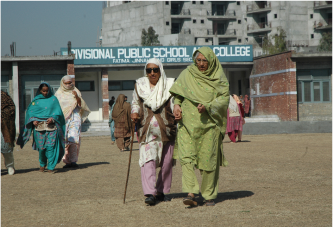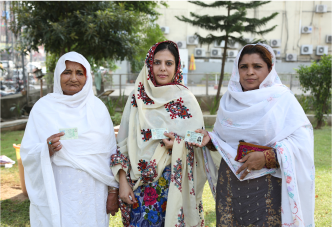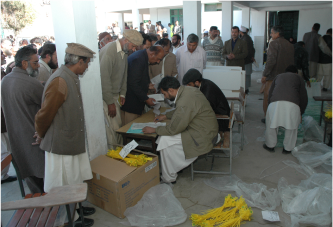

Guiding Principles
Free and Fair Election Network (FAFEN) upholds the following Principles and Values in the performance of its work, public interactions and organizational procedures and process
Non-partisanship
FAFEN does not support any political party.
Accountability
FAFEN is open to public accountability of its governance, work, performance and conduct.
Non-Discrimination
FAFEN does not discriminate and condone discrimination on the basis of caste, color, age or physical disability, etc.
Transparency
FAFEN procedures and processes maximize organizational transparency.
FAFEN Network of Networks
20
Regional Networks
All
Districts
500+
Tehsils
500+
Organizations
FAFEN Strategic Plan
FAFEN Journey

- 2013
- 2015
- 2017
- 2019
Title

In publishing and graphic design, Lorem ipsum is a placeholder text commonly used to demonstrate the visual form of a document or a typeface
Title

In publishing and graphic design, Lorem ipsum is a placeholder text commonly used to demonstrate the visual form
Title

In publishing and graphic design, Lorem ipsum is a placeholder text commonly used to demonstrate the visual form of a document or a typeface
Title

In publishing and graphic design, Lorem ipsum is a placeholder text commonly used to demonstrate the visual form
FAFEN Journey

- November 2006FAFEN, a network of more than 30 civil society organizations, was established in November 2006.
- August 2007FAFEN conducted the Voters List Audit in August 2007, which was the first statically-sound effort by civil society to scrutinize the accuracy and completeness of electoral rolls
- February 2008FAFEN deployed more than 18,000 trained Short-Term Observers on Election Day on February 18, 2008
- March 2008FAFEN as a network never lost sight of the longer-term goals of electoral and governance reform and the importance of the network’s institutionalization and sustainability. While the short-term electoral purpose of FAFEN’s member organizations was achieved in 2008, the network continued to take a leading role towards the subsequent process of electoral reforms.
- August 2008FAFEN started observation of the National Assembly using a comprehensive and robust methodology.
- December 2009The ECP invited FAFEN to make a presentation at the Electoral Reforms Committee formed to recommend measures to improve the electoral process. FAFEN made a presentation to Parliamentary Committee for electoral reforms and released a unique publication called “A Unification of Pakistan’s Election Legislation with Model Provisions for Electoral Reform”.
- January 2010FAFEN developed program methodologies for post-election democracy programming. Activities included constituency relations as well as observation of parliament.
- February 2011Expansion of Parliamentary Observation to the Senate and Provincial Assemblies
- March 2011FAFEN initiated Governance Monitoring of institutions, providing periodic updates to facilitate informed citizen engagement, oversight, and action
- March 2013FAFEN Recommendations for Enhancing Women’s Electoral Participation
- May 2013FAFEN positioned 41,000 observers to monitor the 2013 elections – the largest-ever mobilization of citizens to observe elections. FAFEN conducted the world’s largest parallel vote tabulations (PVTs) in more than 240 constituencies.
- September 2014FAFEN launched public campaign demanding the ECP to post on its website essential documents related to the results of GE-2013
- October 2014Making Each Vote Count: FAFEN Recommendations for Constitutional and Legal Reforms
- June 2015FAFEN Observed the Gilgit Baltistan Elections
- August 2015FAFEN Launches Campaign to Open Up Electoral Reforms’ Committee
- November 2015FAFEN Calls for Women’s Voter Registration Emergency
- December 2015FAFEN Observes the Local Government Elections across the provinces and ICT
- January 2016FAFEN called for new delimitations of the electoral constituencies before the next general elections
- December 2016FAFEN called upon the relevant government authorities to pace up efforts to register as many as 11.67 million women who are missing from the electoral rolls
- January 2017FAFEN Review and Recommendations for Electoral Reforms presented to the Parliamentary Committee on Electoral Reforms (PCER)
- August 2017FAFEN urged the Parliament to address critical weaknesses in the proposed Elections Bill, 2017
- March 2018FAFEN launched Pakistan’s most comprehensive election information portal “www.electionpakistan.com”
- July 2018FAFEN observed the General Elections 2018 by deploying 16,000 trained, ECP-accredited observers
- July 2019FAFEN observes the first-ever elections to the Khyber Pakhtunkhwa (KP) Provincial Assembly (PA) seats in seven districts and Frontier Regions (FRs) of the formerly Federally Administered Tribal Areas
- November 2020FAFEN trained and deployed 529 non-partisan observers, including 496 election day observes and 33 long-term observers (LTOs) to observe the Gilgit-Baltistan Elections
- December 2021FAFEN observed the Khyber Pakhtunkhwa Local Government Elections
- June 2022FAFEN observed the Balochistan Local Government Elections
- June 2022FAFEN’s Review of Preliminary Report of the Delimitation and List of Constituencies for National and Provincial Assemblies
- July 2022FAFEN observed the Sindh Local Government Elections
- September 2023FAFEN urged the ECP to initiate a wide-ranging dialogue on the need for introducing election results audit as well as regulating the election-related use of social media for the upcoming general elections
- February 2024FAFEN deployed 6,000 election observers for observing the General Elections 2024

